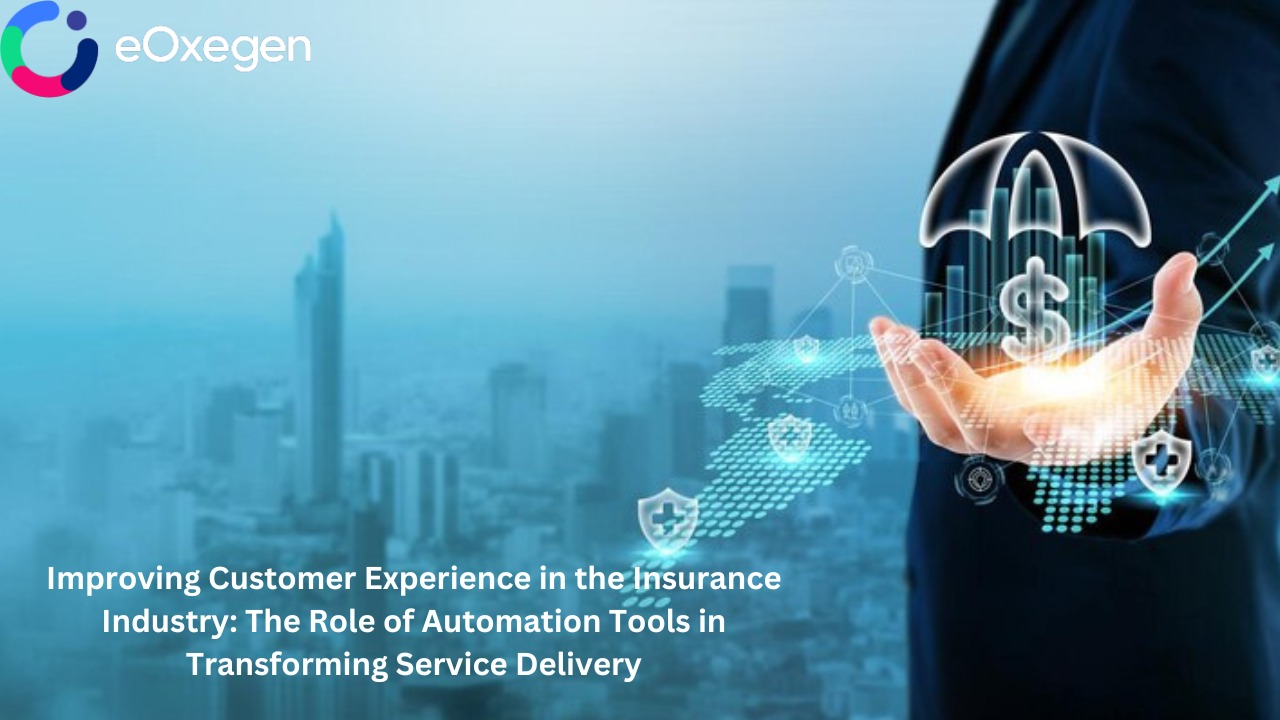Improving Customer Experience in the Insurance Industry: The Role of Automation Tools in Transforming Service Delivery
8 Sep, 2023

In today's ever-changing digital world, providing a positive customer experience has become crucial for the success of every industry, including insurance. As customers now demand easy and efficient services, insurance companies are incorporating automation tools to transform their service delivery and enhance customer satisfaction to unprecedented levels.
Understanding Customer Expectations in the Health Insurance Industry
Here are some of the key ways that customer expectations are evolving in today's digital age:
-
Personalization:
Customers today expect personalized experiences that cater to their unique needs and preferences. To meet this demand, insurance companies must gather and analyze data to better understand their customers. By leveraging this information, they can offer tailored services that align with individual requirements.
-
Convenience:
Customers want convenient and easy-to-use digital channels for interacting with their insurance company. This includes convenient features such as online enrollment, quick and easy claims filing, and round-the-clock customer support.
-
Transparency:
Customers value transparency when it comes to their insurance coverage. This includes having clear information about policy details, copays, deductibles, and out-of-pocket costs. They also want to be able to compare different insurance plans easily.
-
Accuracy:
Customers want accurate information about their insurance coverage. This includes understanding what is and isn't covered and comprehending the terms and conditions of their plan.
-
Responsiveness:
Customers want their insurance company to be responsive to their needs. This means they should be able to get help quickly and efficiently when needed.
Customers today are looking for quick and effortless interactions when it comes to insurance services. The industry is experiencing a change. Whether purchasing a policy, filing a claim, or seeking assistance, today's customers demand responsiveness and efficiency. Meeting these expectations often requires innovative solutions, as traditional methods of service delivery often fall short.
Role of Automation Tools in Customer Experience Enhancement
RephraseAutomation tools are revolutionizing the insurance sector, particularly in enhancing the customer experience. By automating repetitive tasks and processes, insurance companies can allocate resources more efficiently to ensure prompt and accurate customer assistance. From chatbots offering instant answers to AI-powered claims processing systems, automation tools are reshaping how customers interact with insurers.
Automation offers numerous advantages to insurance companies, revolutionizing their operations and interactions with customers. Let's explore how automation brings significant benefits to insurance companies:
Optimized Operational Efficiency
Automation streamlines and accelerates processes that were once time-consuming and labor-intensive. Tasks such as data entry, document processing, and policy management can now be handled seamlessly by automated systems. This leads to faster turnaround times, allowing insurance companies to serve more customers efficiently.
Cost Savings Through Reduced Manual Intervention
By implementing automation, insurance companies can reduce the need for manual intervention, leading to cost savings in labor expenses and associated overhead. This allows them to strategically allocate resources towards innovation and initiatives, prioritizing customer satisfaction.
Improved Accuracy in Data Processing and Reduced Human Errors
Manual data entry is prone to errors, which can result in expensive mistakes. Automation tools, on the other hand, ensure data accuracy and consistency by minimizing human involvement. We can achieve precise policy issuance, claims assessment, and effective customer information management by ensuring accurate data processing. This ultimately enhances the quality of our overall service.
Integrating automation into insurance operations simplifies tasks and strengthens and enhances operational efficiency. Insurance companies that adopt automation are in a better position to provide efficient, error-free services, resulting in increased customer satisfaction and positive financial outcomes.
Benefits of Automation for Insurance Companies
In addition to improving the customer experience, automation tools significantly benefit insurance companies. By streamlining operations and minimizing manual interventions, these tools enhance operational efficiency. This results in cost savings and reduces the risk of human errors, ensuring accurate and consistent data management.
Overcoming Challenges and Concerns
Although automation brings many advantages, there are lingering concerns about replacing the personal connection that humans provide. It's crucial to strike the right balance between automation and maintaining a personalized touch. Many insurance companies have opted for a hybrid approach combining automated solutions with human-agent interactions. This ensures that customers not only experience efficiency but also receive empathy and personalized assistance.
Upcoming Customer-Centric Automation Trends
The insurance industry has a promising future in automation. The rise of AI, machine learning, and predictive analytics offers great potential for delivering a more personalized and proactive customer experience. As these technologies evolve, insurance companies can better anticipate customer needs and provide timely solutions.
Wrapping Up
Automation tools are revolutionizing the insurance industry, taking customer experience to new heights. Far from replacing human interaction, these tools actually enhance it by offering faster and more efficient services. As the insurance landscape transforms, adopting automation becomes a vital strategy for insurers seeking to surpass customer expectations and stay ahead of the competition.
Recent Articles
- How do Big Insurers Engage with the New-Age InsurTech Companies?
- Insurance Management System Integration: Maximizing Efficiency and Performance
- Will Blockchain Technology Reshape the Insurance Market?
- The Future of Health Insurance: Predictive Analytics and AI
- Buy or Build Insurance Software? A Game-Changing Question in Insurance Industry